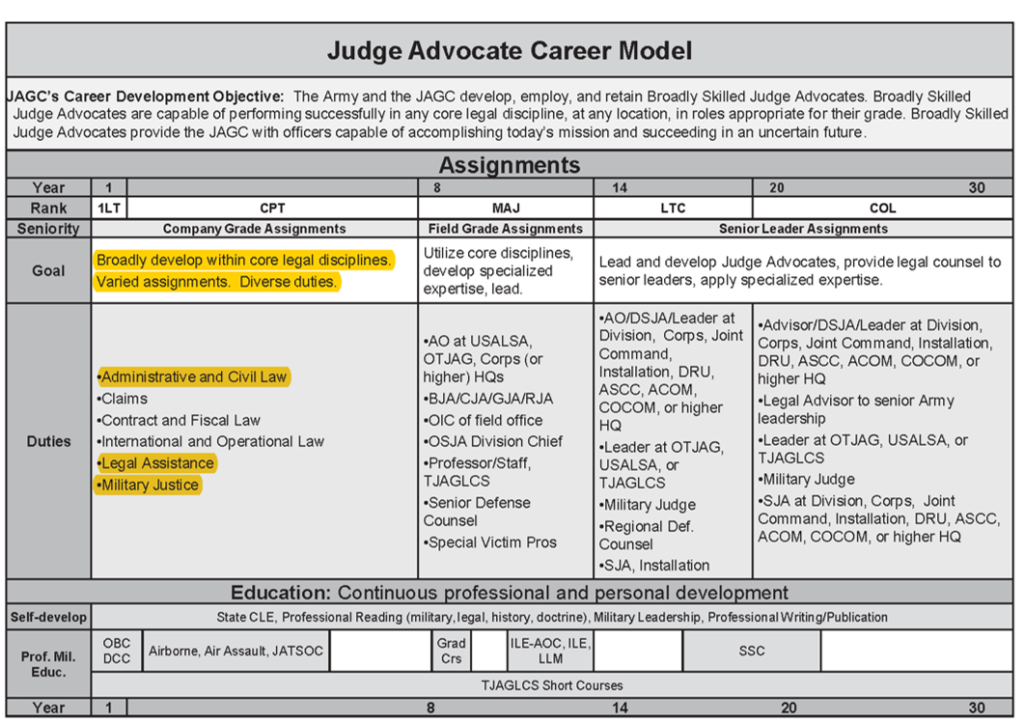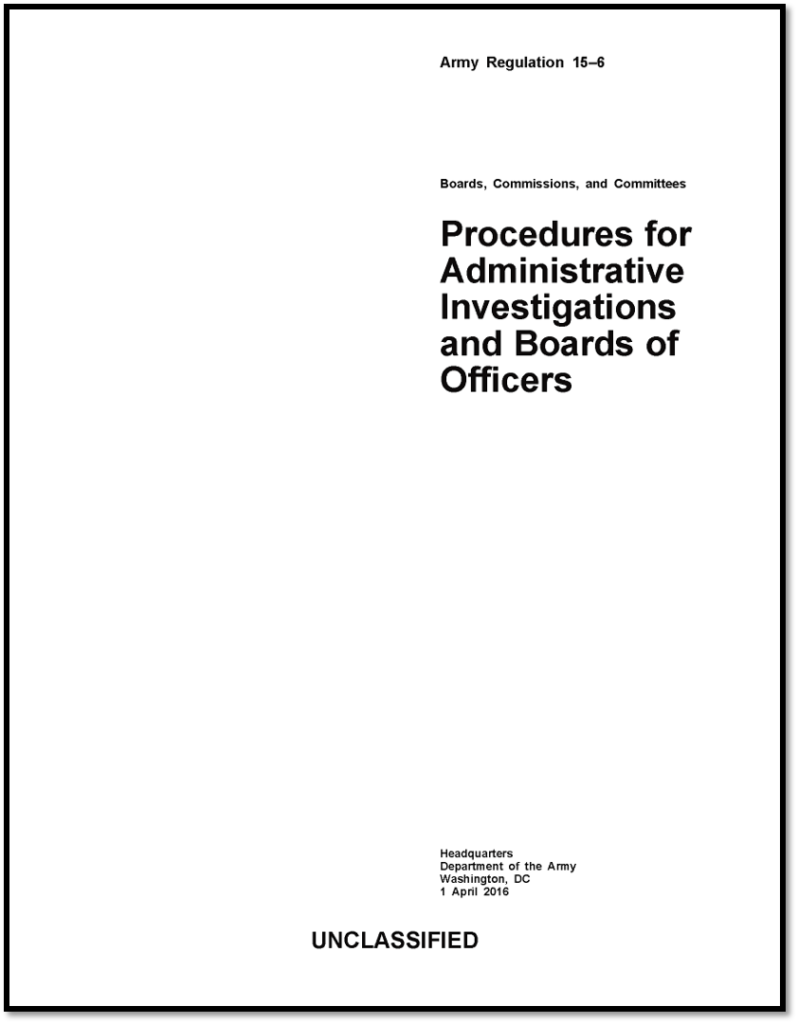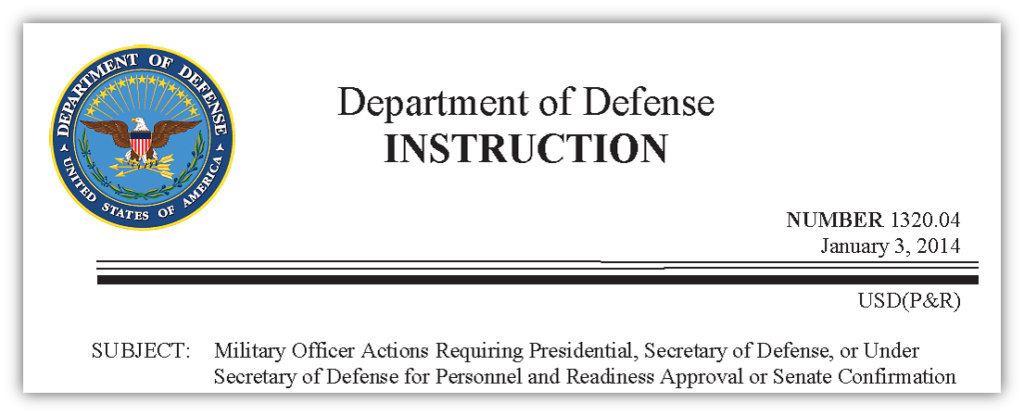In 2014, with little fanfare, the military made important changes to the filing and use of the results of administrative investigations. These changes especially affected field grade officers and their chances to earn future promotions. This blog post discusses the high points of these changes. It also discusses the importance of receiving advice from an experienced military defense lawyer who understands these changes. It is critical to challenge flawed and incomplete investigations at every opportunity. These stages include at upon completion of the investigation, upon discovery of grounds for reconsideration, and when entered into the AIPP database.
The command possesses broad discretion and regulatory authority to investigate misconduct by personnel within their command. At the informal end of the investigation spectrum, a commander may use Rule for Court-Martial (R.C.M.) 303 to conduct a preliminary inquiry of offenses that might warrant trial by court-martial. A commander may carry out the investigation personally or appoint another officer. Law enforcement agencies such as NCIS, OSI and CID conduct criminal investigations involving allegations of serious misconduct.
Another common investigatory tool lies in Army Regulation 15-6 (Procedures for Administrative Investigations and Boards of Officers). This regulation covers preliminary inquiries (less formal – think R.C.M. 303 inquiries), administrative investigations (more formal), and boards of officers (most formal). Commanders should choose the type of investigations based on the purpose of the fact-finding, the seriousness of the subject matter, the complexity of the issue, the need for documentation, and the need for a comprehensive hearing (AR 15-6, para. 1-6(c)). For the sake of this blog post, the focus is exclusively on administrative investigations.
The commander (appointing authority) will appoint an investigating officer (IO) that is well qualified, impartial and senior in rank to anyone under investigation. The IO will consult with a legal advisor, conduct the investigation, and prepare findings and recommendations. The completed investigation will receive a legal review. The approval authority may approve, disapprove, modify, or make consistent additions to the findings and recommendations (para. 2-8).
Referral Requirement and Procedures for Field Grade Officers
If the IO substantiates an adverse finding and the approval authority intends to approve the finding, the approval authority must give the officer notice of the finding and an opportunity to respond before approving it. To qualify as “adverse information,” the findings must be credible (using the preponderance of the evidence standard) and derogatory, unfavorable, or of a nature that reflects clearly unacceptable conduct, integrity, or judgment. It specifically excludes minor violations like moving violations that don’t require a court appearance. Upon notice, the field grade officer should receive a minimum of 10 (ten) business days to seek legal counsel and prepare rebuttal matters. These rebuttal matters are attached as an exhibit to the proceedings and should be prepared by an experienced military defense lawyer with the utmost skill and attention.
Important 2014 Change – DoDI 1320.04 – The Adverse Information Pilot Program (AIPP)
On January 3, 2014, the Department of Defense issued a new instruction to better preserve records for later consideration by promotion boards. It accomplished this objective through the creation of the AIPP database to house adverse information from command investigations. It only applies to field grade officers, as they require Senate confirmation to receive promotions.
All approved substantiated adverse findings resulting from investigations require entry into the AIPP database. Once entered, the data remains present for 10 (ten) years. This data is used by general officer selection boards and contains the document approving the findings and recommendations, the IO’s findings and recommendations, and any rebuttal matters previously submitted.

Before a selection board is convened, an officer with data in the AIPP will receive notice from HQDA. The officer will be permitted to inspect the information and to submit materials to the selection board for their review.
Steps to Consider When Subjected to an AR 15-6 Investigation
Do NOT Agree to an Interview without Advice of a Military Defense Lawyer
All subjects of an investigation have the right to an attorney before, during and after questioning. Do not agree to an interview until appropriate advice has been sought from an experienced military defense lawyer. Even when convinced there is no misconduct, advice of experienced counsel is essential to understanding the risks of a statement. Sometimes, even when there is no misconduct, statements that are not well reasoned can be interpreted as an admission of wrongdoing. On the other hand, false statement for even minor misconduct, may result in administrative actions more serious than the original misconduct. Military rules and regulations are numerous, complex, and often can be hard to locate. Do not make any statement until the facts of the case are thoroughly reviewed by an experienced military defense lawyer. The exercise of the right to remain silent cannot be used adversely or serve as the basis for disciplinary action.
Seek an Experienced Military Defense Lawyer
Seek the advice of an experienced military defense lawyer, whether civilian or provided by the military, as soon as possible. One should not wait until receiving a referred report of investigation or receiving an interview request from an IO. There may be practical, helpful steps that can be taken during the investigation to aid the discovery of relevant information. These steps should be discussed with a military defense lawyer to ensure that they don’t interfere with the investigation or otherwise lead to unintended consequences.
If relying solely on a detailed military legal assistance attorney, understand the advice and assistance will likely be from a junior judge advocate in his or her first assignment. All services develop “generalists” as opposed to specialists, and assign young officers to legal assistance as their first duty. The Army demands “diversity of assignments” for promotion. The Navy permits judge advocates to see clients “immediately following graduation from Naval Justice School. ” The Marine Corps strives to develop “general practitioners” not specialists. Below is the Army Judge Advocate career model showing the effort to create generalists with “varied assignments” of captains.

While highly intelligent, competent, and trained; these junior officers likely have little experience working with senior commanders or understanding how to influence senior leaders. Likely, they have limited experience advising senior officers about complicated matters affecting their career progression. Further, knowledge and understanding of the intricacies and nuances of perceived misconduct, and its effect on command and discipline, are likely still developing in these junior judge advocates. When choosing only to utilize a detailed military defense counsel or military legal assistance attorney, seek a field grade officer with substantial experience who is knowledgeable about the unique effects of investigations (including AIPP) on field grade officers.
Thoroughly Rebut and Respond to the Investigation’s Findings and Recommendations
Take full advantage of the opportunity to submit matters in rebuttal to the investigation. These matters may include a memorandum from the military defense lawyer detailing errors in the investigation, a letter from the subject of the investigation explaining his or her conduct and possibly providing extenuating and mitigating facts, possible additional evidence, and letters of support from relevant parties. Even if the command is not recommending adverse action in response to the findings (such as a GOMOR or non-judicial punishment), any adverse finding (for field grade officers) could live on in the AIPP database and tarnish a military record for ten years.
Consider Seeking a Reconsideration of the AR 15-6 Investigation
Consider submitting a request for reconsideration when appropriate. Grounds for reconsideration include discovery of new evidence, mistake of law, mistake of fact or administrative error. Requests for reconsideration are generally limited to one (1) year after approval of the investigation. Do not delay contacting an experienced military defense lawyer should a basis for reconsideration exist impacting the investigation’s findings.
Respond to AIPP Adverse Information Before Promotion Board
A colonel within 1-2 years of consideration for brigadier general, should seek the advice of an experienced military defense lawyer. The lawyer will review the case and determine the best course of action to refute adverse information in AIPP. Counsel can submit FOIA requests to obtain government records that might aid in crafting an effective response. Doing so can take time, especially if the records sought are numerous or hard to locate. An experienced military defense counsel may also conduct an independent investigation of the matter. As with most tasks in the military, proper planning, thorough investigation and wise counsel invariably lead to better results. It is incumbent on the officer to take charge in this process. Assisting counsel in rebutting an investigation’s adverse findings at all available stages is essential to preserve one’s military career.
The Law Office of Will M. Helixon has prepared a video outlining what a military member should do if they are under investigation. Click on the link above to watch the video.
More about the Law Office of Will M. Helixon.
Will M. Helixon established the Law Office of Will M. Helixon in February of 2016. Originally headquartered in Kansas City, Missouri, the firm’s original mission was to defend members of the military in courts-martial, adverse administrative proceedings and other criminal proceedings. Today, the firm has worked as military lawyers in multiple complex and high-profile military cases. The firm now handles most military matters, including medical issues involving the MEB/PEB process, adverse administrative matters, military justice matters, and legal assistance matters, including the correction of military records. No longer in Kansas City, the firm now has a European office physically located in Vilseck, Germany. Call us today to assist with your legal issue in Germany or the United States. All military lawyers at the Law Office of Will M. Helixon maintain licenses to practice before all military trial courts.
Law Office of Will M. Helixon – Vilseck – Germany, Hans-Ohorn-Platz 7, First Floor, 92249, Vilseck, Germany.
Germany +49 (0) 9662-293-8047
United States (913) 353-6466



